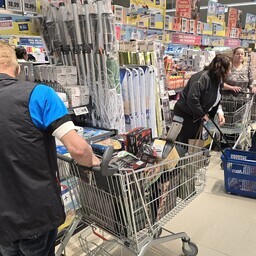Inimesed ostavad tööstuskaupu rohkem veebist
kui poodidest.
See mõjutab suuri hüpermarketeid
, kus tööstuskaupadel on suur osa müügis.
Inimesed ostavad tööstuskaupu rohkem veebist
Tõlge fraasile: Inimesed ostavad tööstuskaupu rohkem veebist
EN
People are buying industrial goods more online
See mõjutab suuri hüpermarketeid
Tõlge fraasile: See mõjutab suuri hüpermarketeid
EN
This affects large hypermarkets
Veebipoodidel on võtnud hüpermarketitelt osa tööstuskaupade müügist.
Näiteks ostetakse kohvimasinaid
, käterätte, sokke ja lasteriideid Saksamaalt või Hollandist. Need kaupad on lihtne tellida ja hinnapakkumisi on lihtne näha.
Näiteks ostetakse kohvimasinaid
Tõlge fraasile: Näiteks ostetakse kohvimasinaid
EN
For example, coffee machines are bought
Hüpermarketid kannatavad selle tõttu
.
Inimestele meeldivad pigem väiksemad poed
.
Supermarketid on populaarsemad
, sest klientidele meeldib suur toidute valik.
Hüpermarketid kannatavad selle tõttu
Tõlge fraasile: Hüpermarketid kannatavad selle tõttu
EN
Hypermarkets suffer because of this
Inimestele meeldivad pigem väiksemad poed
Tõlge fraasile: Inimestele meeldivad pigem väiksemad poed
EN
People prefer smaller stores
Supermarketid on populaarsemad
Tõlge fraasile: Supermarketid on populaarsemad
EN
Supermarkets are more popular
Eestis on palju poesid. Näiteks
Keilas avatakse uusi poesid
.
Rimi avab seal uue supermarketi
. Lisaks tuleb Lidl ja Coop. Rimi kaupluse juht on kindel, et konkurents ei ole oht, vaid võimalus.
Keilas avatakse uusi poesid
Tõlge fraasile: Keilas avatakse uusi poesid
EN
New stores are opening in Keila
Rimi avab seal uue supermarketi
Tõlge fraasile: Rimi avab seal uue supermarketi
EN
Rimi is opening a new supermarket there
Kui poegruum on liiga palju, on raske konkureerida. Näiteks ehituspoodides on suur konkurents. Rimi suleb ka mõned kauplused, kui need ei toimi hästi.
Rimi juht ütleb, et oluline on teha tulusaid otsuseid.
Konkurents paneb ettevõtted leidma uusi võimalusi
.
Konkurents paneb ettevõtted leidma uusi võimalusi
Tõlge fraasile: Konkurents paneb ettevõtted leidma uusi võimalusi
EN
Competition makes companies find new opportunities
People are buying more industrial goods online than in stores. This affects large hypermarkets, where industrial goods make up a significant portion of sales.
Online stores have taken away a share of industrial goods sales from hypermarkets. For example, people are buying coffee machines, towels, socks, and children's clothing from Germany or the Netherlands. These goods are easy to order, and price offers are easy to compare.
Hypermarkets are suffering as a result. People prefer smaller stores. Supermarkets are more popular because customers appreciate the large selection of food products.
There are many stores in Estonia. For example, new stores are opening in Keila. Rimi is opening a new supermarket there. Additionally, Lidl and Coop are coming. The manager of Rimi is confident that competition is not a threat but an opportunity.
When there are too many stores, it becomes difficult to compete. For example, there is intense competition in hardware stores. Rimi is also closing some stores if they are not performing well.
The manager of Rimi says it is important to make profitable decisions. Competition forces companies to find new opportunities.

